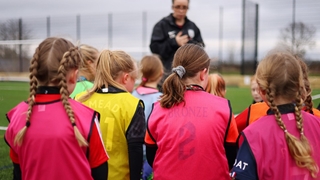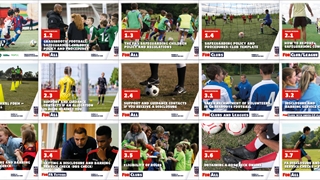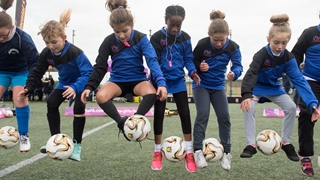
Football is proud to have a network of Designated Safeguarding Officers (DSO) across football – all supporting safe and fun environments for everyone. The majority of this network consists of volunteers within grassroots football. They are generally known as Welfare Officers. Those working in the professional clubs are referred to as DSOs.
While the title may differ, the intention is the same. With the support of your senior management/committee the role is key in:
- Reviewing current practices;
- Promoting safeguarding awareness and training;
- Promoting a culture of listening to children;
- Ensuring compliance with safer recruitment practices, including DBS checks at every level of the game.
For more detail on the above, see Guidance Notes 5.3: Welfare Officers’ Roles and Responsibilities at the foot of this page.
If you are a Premier League Club DSO, you can get further information and support via safeguarding@premierleague.com.
If you are an EFL (English Football League) club DSO, you can get further information and support via safeguarding@efl.com.
Supporting the grassroots welfare officer network
Each County FA has a DSO who is responsible for supporting their local welfare officer network. The County FA DSO is the welfare officers’ first point of contact for advice and guidance, so it’s important to know how to contact them. All County FA DSO details can be accessed via your local County FA.
Find your local County FA website
Then go to the ‘About’ section of your County FA website and look under ‘Football Services’ staff for the name and contact details for the County FA DSO.
County FAs host networking sessions so welfare officers can meet with the County FA DSO and other club and league welfare officers. We strongly recommend attending these sessions to remain current and up-to-date with best practice.
England Football’s ‘Club Portal’ online club management tool.
Click here to manage your club and team officials.
The Club Portal allows Club Welfare Officers and Club Secretaries to easily track the safeguarding training and DBS status of all officials in their club via the ‘Safeguarding’ tab. It’s also where every club is required to sign up to confirm their commitment to safeguarding when affiliating.
First point of contact
It’s vital that everyone in the club/league knows who the welfare officer(s) are and how to contact them. This is especially true for players, parents/carers and coaches. If parents/carers have a poor practice concern, the club welfare officer is the first point of contact. It’s important the club is given the opportunity to resolve the matter before seeking any escalation.
Large or expanding club/leagues are likely to benefit from their committee appointing an additional welfare officer(s) to support the work they are doing. We would recommend clubs with more than 10 teams consider having additional welfare officers.
Becoming a Welfare Officer
Grassroots clubs are often looking for volunteers, if you’d like to find out more about the role and/or are considering becoming a Welfare Officer then read Guidance Notes 5.3: Welfare Officers’ Roles and Responsibilities at the foot of this page. In addition, Guidance Notes 5.2 contains the Welfare Officers’ Code of Conduct. Speaking to someone who already has the role is also helpful.
Appointing a Welfare Officer
If you’re a club or league looking to appoint a Welfare Officer, please read Guidance Notes 5.1: Appoint a Welfare Officer at the foot of this page.
Please bear in mind that all Welfare Officers must have:
- Attended The FA Safeguarding Children and Welfare Officer Workshops. For more information, visit Section 4: Safeguarding Training.
- Completed The FA Safeguarding for Committee Members’ course (free, online) which you’ll find here or visit visit Section 4: Safeguarding Training.
- An in-date FA-Accepted Enhanced with Children’s Barring List Check. For more information, visit Section 3: Safer Recruitment and DBS Checks.
Respect
This is a programme by The FA aimed at helping us all to work together to improve behaviour standards on and off-the-field. Currently, the message ‘We Only Do Positive' is aiming to influence coaches and parents/carers within mini-soccer and youth football.
As a welfare officer you have the chance to make a significant contribution to creating positive change. 'We Only Do Positive' aims to promote and educate coaches and parents on their roles in creating a fun, safe and inclusive environment for all the players, ensuring they have great experiences throughout their football journey. These core principles work in tandem with safeguarding children.
Read more about Respect
Please also read…
Designated Safeguarding Officers are encouraged to follow the link below to access all The FA’s safeguarding advice and guidance:









